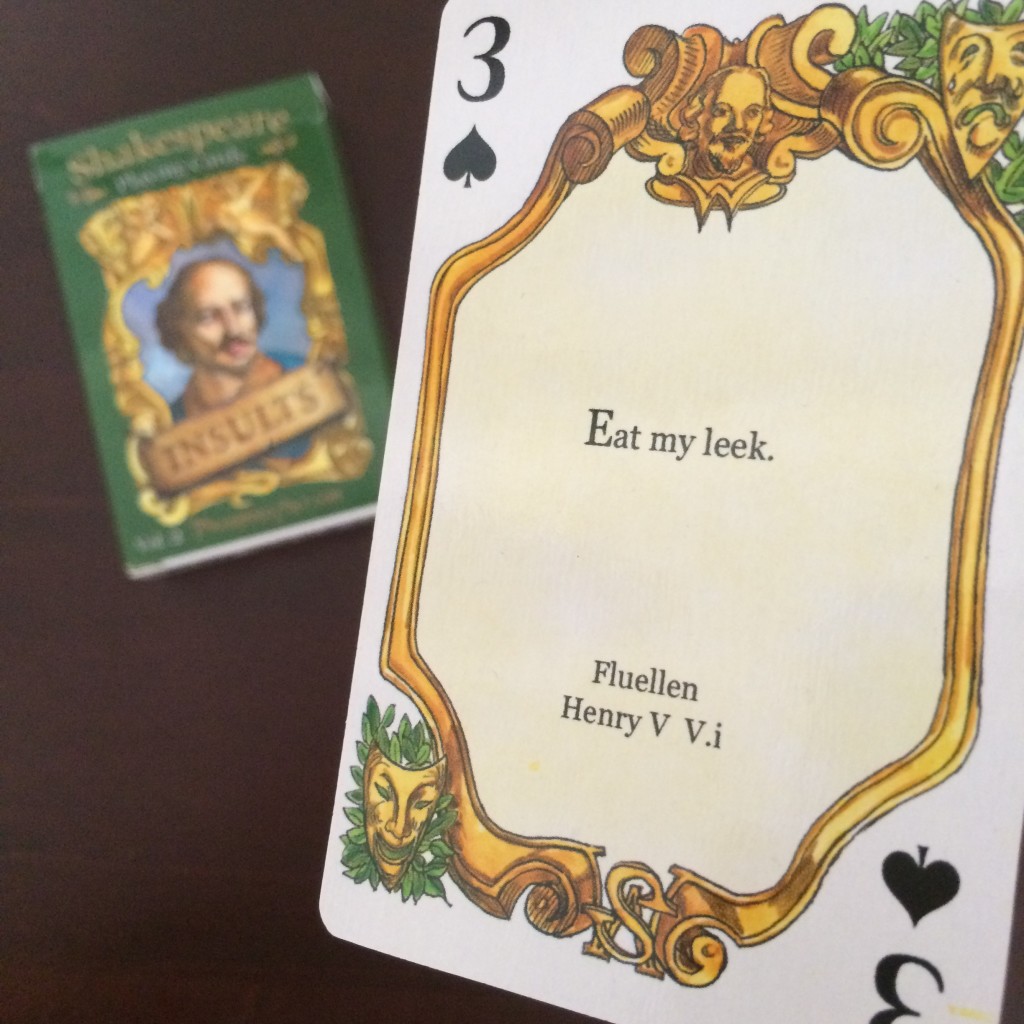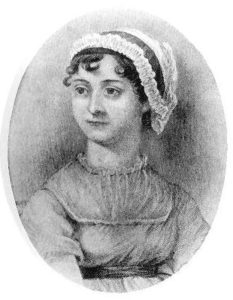
This essay was part of the 2016 Deal Me In Reading Challenge, where I read a short story, essay, or poem every single week. Each item on my reading list was assigned to a playing card, and every Friday I picked a card at random to choose my weekly read.

Love and Freindship [sic] is a lovely gem unlike any of Austen’s full-length novels. It was one of her early attempts at writing, and is one of many stories she wrote to entertain her family. Perhaps that entertainment factor is why the story is so outlandish and the characters so ridiculous–I can only begin to imagine the laughter it caused.
This epistolary tale can be read for free, on Pemberley.com, here.
The Story
Ok, so I did mention that the characters are ridiculous, right? I meant it. If they have any brains, they don’t use them. Their irrational thoughts and deeds are ruled by emotions alone, and even those are uncommonly silly.
The story unfolds within a series of letters from Laura to her friend’s daughter, Marianne, outlining her life story in the hopes that Marianne will learn some valuable lessons.
Laura’s story begins with a knock on the door. She and her family are enjoying an evening at home when they hear the knock, proclaiming it to be an “uncommon violence exerted against our unoffending door.” (I mean, the door was just standing there!) They keep saying they’re pretty sure someone is at the door, but don’t actually do anything about it. Laura even makes the silly exclamation, “Oh! let no time be lost” …as they continue to sit there, not answering the door. I’ll quote the whole scene here, because you must understand the level of absurdity:
ONE Evening in December, as my Father, my Mother, and myself were arranged in social converse round our Fireside, we were, on a sudden, greatly astonished by hearing a violent knocking on the outward Door of our rustic Cot.
My Father started — “What noise is that,” (said he). “It sounds like a loud rapping at the door” — (replied my Mother). “It does indeed,” (cried I). “I am of your opinion; (said my Father) it certainly does appear to proceed from some uncommon violence exerted against our unoffending door.” “Yes (exclaimed I) I cannot help thinking it must be somebody who knocks for admittance.”
“That is another point (replied he); We must not pretend to determine on what motive the person may knock — tho’ that someone does rap at the door, I am partly convinced.”
Here, a second tremendous rap interrupted my Father in his speech, and somewhat alarmed my Mother and me.
“Had we not better go and see who it is? (said she) The servants are out.” “I think we had,” (replied I).
“Certainly, (added my Father) by all means.” “Shall we go now?” (said my Mother). “The sooner the better,” (answered he). “Oh! let no time be lost” (cried I).
A third, more violent Rap than ever, again assaulted our ears. “I am certain there is somebody knocking at the Door,” (said my Mother). “I think there must,” (replied my Father). “I fancy the servants are returned; (said I) I think I hear Mary going to the Door.” “I’m glad of it (cried my Father) for I long to know who it is.”
You see?? Absurd.
It turns out the person knocking is a lost traveler named Edward seeking refuge. Laura falls in love with him at first sight:
“no sooner did I first behold him, than I felt that on him the happiness or Misery of my future Life must depend.”
Edward tells his story: his father is trying to get him to marry a Lady Dorothea, but he refuses…just for the sake of refusing his father.
“Lady Dorothea is lovely and Engaging; I prefer no woman to her; but know, Sir, that I scorn to marry her in compliance with your Wishes. No! Never shall it be said that I obliged my Father.”” We all admired the noble Manliness of his reply.
Yes. Manliness.
After this, Laura and Edward are instantly married (!). Edward’s family isn’t pleased.
The couple goes to visit yet another imprudently married couple: Augustus and Sophia. Laura, speaking directly to Marianne, gushes more anger towards parental authority:
Convinced as you must be from what I have already told you concerning Augustus and Sophia, that there never were a happier Couple, I need not, I imagine, inform you that their union had been contrary to the inclinations of their Cruel and Mercenary Parents; who had vainly endeavoured with obstinate Perseverance to force them into a Marriage with those whom they had ever abhorred; but with an Heroic Fortitude worthy to be related and admired, they had both constantly refused to submit to such despotic Power.
Augustus is soon arrested for debts owed, and Laura and Sophia can only sigh and faint on the sofa in reaction to such “injustice.”
Edward departs to see Augustus in prison while Laura and Sophia go to stay with Sophia’s relation. On the way, Laura magically identifies her long lost grandfather in passing:
Attention was attracted by the Entrance of a coroneted Coach and 4 into the Inn-yard. A Gentleman considerably advanced in years, descended from it. At his first Appearance my Sensibility was wonderfully affected, and e’er I had gazed at him a second time, an instinctive sympathy whispered to my Heart that he was my Grandfather. Convinced that I could not be mistaken in my conjecture, I instantly sprang from the Carriage I had just entered, and following the Venerable Stranger into the Room he had been shewn to, I threw myself on my knees before him and besought him to acknowledge me as his Grand-Child. He started, and after having attentively examined my features, raised me from the Ground, and throwing his Grand-fatherly arms around my Neck, exclaimed, “Acknowledge thee! Yes, dear resemblance of my Laurina and Laurina’s Daughter, sweet image of my Claudia and my Claudia’s Mother, I do acknowledge thee as the Daughter of the one and the Granddaughter of the other.”
Within minutes, he is randomly reunited with 4 of his grandchildren:
“What an unexpected Happiness is this! to discover in the space of 3 minutes, as many of my Descendants!”
After hugging and tears, he quickly writes each of them a banknote for 50 pounds and then runs off–just like that!
Laura and Sophia faint from the shock (of course). They wake to find that their cousins stole their money.
They continue their journey and arrive at the house of Sophia’s cousin, Macdonald. After he hosts them and shows them kindness, they overthrow his plans to marry his daughter to a particular gentlemen, and convince her to run off with another. They also steal money from him.
After he kicks them out, they come across a carriage accident on the road and find Edward and Augustus bleeding on the ground. They die, and the women go into complete hysterics:
Sophia shreiked and fainted on the Ground — I screamed and instantly ran mad. — We remained thus mutually deprived of our Senses some minutes, and on regaining them were deprived of them again. For an Hour and a Quarter did we continue in this unfortunate Situation — Sophia fainting every moment and I running Mad as often.
They’re taken into a nearby cottage, whereby Sophia then dies. Laura continues on and, in far-fetched happenstance, she unwittingly ends up in the same coach with all her acquaintance and relations (father, sister-in-law, cousins, etc) Her father-in-law gives her 400 pounds a year for being the widow of his son, and Laura lives out the rest of her years in solitude, mourning the death of her husband, friend, and parents (which she briefly mentions in an “Oh yeah, by the way” fashion earlier in the story).
Meaning
After all that, what do all the ludicrous antics and unbelievable coincidences mean? It means Austen finds many real-life romantic notions absolutely silly. She uses this story to humorously mock all conceptions of love at first sight and superficial female friendship.
In the end, Laura’s parting advice to Marianne is Sophia’s dying words:
“Beware of swoons Dear Laura …. A frenzy fit is not one quarter so pernicious; it is an exercise to the Body and if not too violent, is I dare say conducive to Health in its consequences – Run mad as often as you chuse; but do not faint – ”
Finis.

